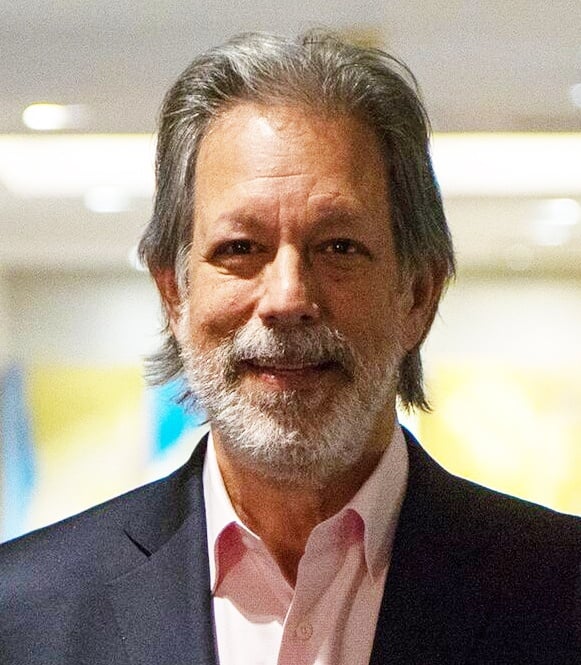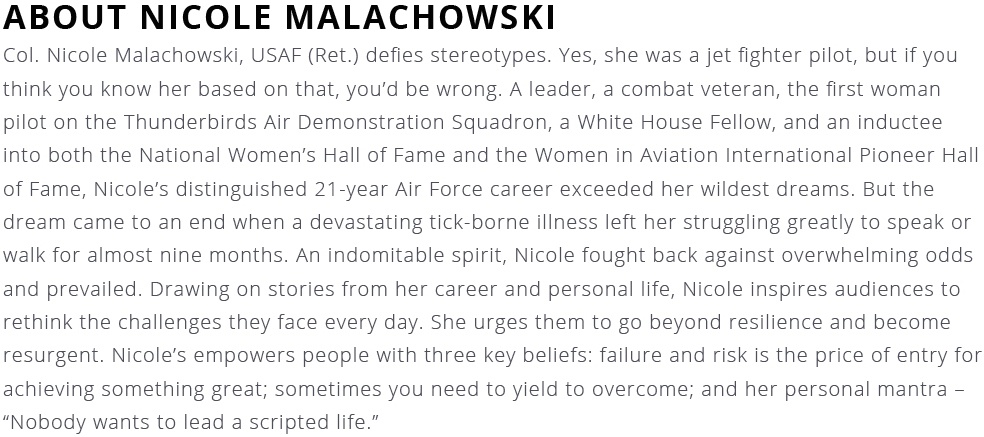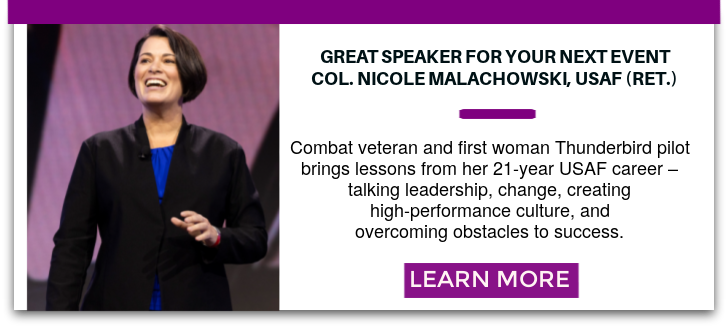Building Trust by Being Trustworthy: The Organizational Culture of the Thunderbirds
THUNDERBIRD PILOT NICOLE MALACHOWSKI TALKS ABOUT TRUST AND FLYING 400 MPH AND 3 FEET APART
Trust: It’s the fuel that feeds high-performing organizations. 21-year Air Force veteran Colonel NICOLE MALACHOWSKI, USAF (Ret.), the first-ever woman USAF Thunderbird pilot, is frequently asked to talk on the subject. Her story about making the transition from fighter pilot to Thunderbird pilot is filled with valuable lessons for organizations looking to elevate their performance.
THE THUNDERBIRDS – NOT THE TYPICAL FIGHTER SQUADRON
Nicole had been a fighter pilot for about eight years when she joined the Thunderbirds. She’d been in three operational F-15E squadrons. She’d flown in combat many times. “I thought I knew everything,” she tells people. In an F-15E squadron, the fighter pilots are separate from the rest of the team. “I knew that there were people who worked on the life-support equipment like my helmet, my harness, and my g-suit, but that was what they did. My g-suit just showed up. I knew that there were people who worked in public affairs, I knew that there were people that worked in supply, but for me it was all about being a fighter pilot.”
It wasn't until Nicole joined the Thunderbirds that she gained a completely new understanding of what it meant to be a true team player. “When I showed up to the Thunderbirds, that squadron is run very differently than any other fighter squadron in the entire Air Force. Everybody who's part of the mission of flying those air shows is in the same squadron - public affairs, supply, crew chief, life-support, the finance guy. There are no silos in the Thunderbirds. There's no easy way of ignoring what everybody else does in the mission. You don't see that in a regular fighter squadron.”
When she joined, Nicole thought, "Let's go. Let's get ready to fly." “No,” she was told, “first you have to get to know everybody out there.” They don't let pilots touch an F-16 on the Thunderbirds until they get to know every single person on the team. And it wasn't so much that Nicole had to know this person existed as a crew chief and that they were married and had kids and what their hometown was – she had to learn about how they impacted each other. “If I don't uphold my end of the bargain as the pilot, how does that impact my crew chief, and if he or she doesn't uphold her end of the bargain, how does that impact me? There were over 125 people from more than 25 different career fields that made that mission happen, and all it took was one, just one person not doing their job and that mission did not happen.”
The point Nicole is looking to make when she speaks to audiences about this experience is this: When was the last time you really reached out to get to know those other people on your teams who enable and empower you in your unique positions to do what you do? Breaking through your organizational silos by getting to know how you are actually accountable and responsible to them, and vice versa.
Build Trust by Being Trustworthy
When the day finally came for Nicole to go on her very first flight, her crew chiefs, Nate Pigza and Dave Batterson, came running out to welcome her. "Hi ma'am, welcome to the Thunderbirds. Glad you get to have your first flight.” With that Nicole started her customary aircraft pre-flight – walking around the aircraft to make certain everything was safe - something she’d done hundreds of times over eight years and three fighter squadrons. In the middle of the pre-flight one of them said, "Ma'am, what are you doing?" "Pre-flighting the plane,” she said. "You don't pre-flight the plane here,” they said, “We pre-flight the plane for you. The mission of the Thunderbirds in this particular portfolio and what we do, this is our job.” To her utter surprise, she was told they also pre-flight all of her life-support equipment and even strap her harness to the ejection seat. “We do this for you,” they told her, “you just have to trust us."
Learn how to create a culture of trust in your organization
Invite NICOLE MALACHOWSKI to speak at your next event
TRUST: THE GLUE THAT CREATES GREAT
ORGANIZATIONAL CULTURES
“Right,” Nicole tells people about this experience. “It's called life support equipment for a reason. It's my life, right? I've got to tell you, I looked at these guys and I'm thinking, ‘Who are you? What have I signed up for? How am I supposed to trust you?’ I initially and immaturely resented them at that time and I will admit it made me a bit apprehensive when I went out there to fly. Then one day, I went out and saw Nate Pigza down his knees in the desert heat polishing the heck out of the wheel rims of this F-16, because he cared. It hit me: Nicole, you need to grow up. He takes as much pride in doing his job as I do.”
The audience takeaway from Nicole’s anecdote is to recognize that everyone plays a role and takes pride in that role. So often, people look at others in the organization and think, "I can do that better than them!” Or, “She sent another email!” Or, “Oh gosh, he called another meeting!” The idea is to take a step back and give a moment of grace and realize that everybody else who works with you and for you comes to work to do their best. Let them take pride in what they do. “I grew up,” says Nicole now, “and by the end of air show season it was Dave Batterson who would strap me into the jet. He was the last person I ever talked to before every single air show, the last person I would look in the eye. He would strap me in and check that I was connected to my ejection seat and he would look down at me and say, ‘Rock and roll, Three,’ (Nicole flew the number three position on the team) and I would look up at him and say, ‘Thanks for letting me borrow your jet.’”
Those first few months on the Thunderbirds led to a crucial transformation for Nicole as a teammate and a leader. In coming to understand how the pieces of the organization fit together and the pride each person took in the job they did, Nicole began to interact with each person in a completely new way. Simple courtesies were crucial to maintaining a trust-based culture. The lesson: She asks her audiences, “When was the last time you thanked those other people across your organization who make it happen? You might be the engineer, you might be in HR or anything in-between, but you all impact each other,” Nicole says.
SUPPLEMENTAL READING: BREAKING BARRIERS: 1ST FEMALE THUNDERBIRD PILOT HAS MESSAGE FOR WOMEN and
LEADERSHIP Q&A: FIRST WOMAN USAF THUNDERBIRD PILOT
IS ROCK-STAR AVIATOR
BUILDING TRUST BY BEING TRUSTWORTHY
When she speaks, Nicole gets asked a lot - what's it like to trust people at a level to fly three feet away from them? “I think it's a valid question. I didn't fly with any of these gentlemen before I joined the Thunderbirds, so it was like we just met and ‘Nice to meet you. Let's fly three feet away from each other, 500 feet off the ground at 400 miles an hour, upside down. Are you ready?’ And when people ask me, ‘What does it take to trust people to this level?’ the answer is simple: You build trust by being trustworthy.”
Too often, in relationships and in business and intense environments, we act believing that building trust starts with someone else's actions. “That's not true,” says Nicole, “Trust starts with you. You build trust on teams by being completely dependable and trustworthy in the role that you have been called to do. You are so dependable and so trustworthy under any circumstance that if anyone in this room has a question about your portion of the portfolio, it is muscle reflex, instantaneous that they pick up the phone and call you because they know you are the subject matter expert.” You have done everything in your power to always be accountable to the standard and always be accountable to the role that you've been called to do right here, especially as leaders.
“I was given a three-foot bubble to move around in. I could move up and down three feet left and right, three feet forward or back - three feet, that was my lane. As long as I stayed in that bubble and everybody else agreed to stay in their bubbles, we were going to stay out of each other's way. Each of us - fulfilling our individual roles to the very best of our ability - that’s how the formation came together.”
Nicole continued, “I remember when I first started flying, and I used to look across to the guy flying the left-wing during training season, and he'd be moving around in his three-foot bubble. Here I am hurdling through space thinking, ‘Why is he over there moving around? What is he doing?’ Wow - what a stupid thing to do, right? Don't fly in other people's positions. Stay out of other people's cockpits.”
To break down the silos we’ve been talking about you do need to know what people do, you do need to know the role that they play in that overarching formation and in that mission, but Nicole talks about the importance of letting them fly their role. “Trust is built by being completely dependable in all circumstances. I wasn't called to be the leader, I wasn't called to be left-wing, I was called to be completely dependable at all circumstances in the number three position,” says Nicole now.
To remind pilots of that pact, the last thing that aircrew say to each other before they fly, is, “When in doubt, always honor the ‘Wingman Contract.’” It’s a crucial part of flying together – as Thunderbirds and in combat. The idea has valuable lessons for business, too, but that is a subject for a future blog on Nicole and her incredible message she shares with audiences.
About Tony D'Amelio
Tony has spent his career putting talented people and audiences together, first in the music business and later representing the world's leading speakers. After concluding 27 years as Executive Vice President of the Washington Speakers Bureau, Tony launched D'Amelio Network, a boutique firm that manages the speaking activities of a select group of experts on business, management, politics and current events. Clients include: Mike Abrashoff, Mariana Atencio, Chris Barton, Lisa Bodell, Geoff Colvin, Daryl Davis, Suneel Gupta, Ron Insana, Katty Kay, Polly LaBarre, Nicole Malachowski, Ken Schmidt, and Bob Woodward.

.png)

.jpg)



